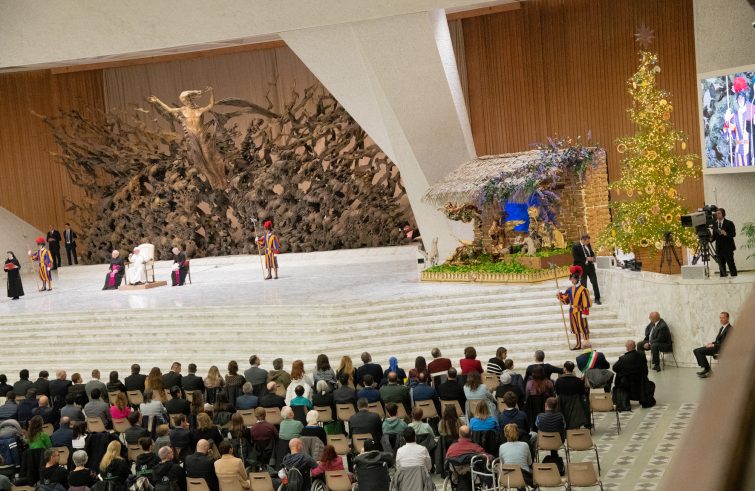
“The many cases of violence in the domestic sphere, of which we unfortunately have frequent news, almost always arise from the claim of possession of the affection of the other, from the search for absolute security that kills freedom and stifles life, making it hell,” the Pope said in the catechesis of the Wednesday General Audience in Paul VI Hall, devoted to the steps that follow our decisions, within the discernment process. “Only God knows what is good for us”: “possessiveness is the enemy of goodness.” “We can only love in freedom, which is why the Lord created us free, free even to say no to Him”, Francis assured. At the end of the audience, the Pope made yet another appeal for peace. In his greetings to the Italian-speaking faithful, Francis referred to “all those tried by the brutality of the war, and especially tormented Ukraine.” Addressing Polish-speaking pilgrims shortly earlier, he recalled the anniversary of Operation Reinhardt, the extermination plan that claimed two million lives, mostly Jews. “May the memory of this horrible event arouse resolutions and actions for peace in all” the Pope said. “History repeats itself, it repeats itself, it repeats itself… we see what is happening today in Ukraine,” he added in unscripted remarks.
“In life some decisions are not good and there are signs that disprove them, while on the other hand, good ones are confirmed”,
the Pope said in the opening lines of today’s catechesis. “One of the distinctive signs of the good spirit is the fact that it communicates a peace that lasts in time”, Francis said: “If you make a decision, and this gives you a peace that lasts through time, this is a good sign and indicates that the path was good. A peace that brings harmony, unity, fervour, zeal. You emerge from the of the process better than when you entered it.” The Pope offered an example: “if I make the decision to devote an extra half hour to prayer, and then I find that I live the other moments of the day better, that I am more serene, less anxious, I do my work with more care and zest, that even relations with some difficult people become smoother…” “These are all important signs in favour of the goodness of the decision taken”, the Pope said.
“Spiritual life is circular,”
Francis remarked: “the goodness of a choice benefits all areas of our lives. For it is participation in God’s creativity.”
In fact, a good decision, “is not born out of fear, emotional blackmail or compulsion. It is born out of gratitude for the goodness received, which drives the heart to live liberally in relationship with the Lord.”
An important element to assess whether we have made the right decision, after the discernment process, “is the awareness of feeling in one’s proper place in life and a part of a larger plan, one to which we wish to offer our own contribution.” In St. Peter’s Square, the Pope noted, “there are two precise points – the focal points of the ellipse – from which one can see Bernini’s columns perfectly aligned.” Similarly, “a man can recognize that he has found what he is looking for when his day becomes more orderly, when he feels a growing integration among his many interests, when he establishes a proper hierarchy of importance, and when he is able to experience this with ease, facing the difficulties that arise with renewed energy and fortitude.” “These are signs that you have made a good decision”, Francis said: “Another good sign of confirmation, for example, is the fact of remaining free with regard to what has been decided, being willing to question it, even to give it up in the face of possible denials, trying to find in them a possible teaching from the Lord. This is not because He wants to deprive us of what we hold dear, but in order to live it with freedom, without attachment.”
“Offering Him what we hold most dear is in our best interest, enabling us to live it in the best possible way and in truth, as a gift He has given us, as a sign of His gratuitous goodness, knowing that our lives, as well as the whole of history, are in His benevolent hands.”
It is what the Bible calls the fear of God, that is, respect for God: “It is the fear that casts out all other fears, because it is oriented to Him who is Lord of all things. In His presence, nothing can disquiet us. It is the wondrous experience of St. Paul, which he expressed in this way: ‘I know how to be abased, and I know how to abound; in any and all circumstances I have learned the secret of facing plenty and hunger, abundance and want. I can do all things in him who strengthens me.’ This is the free man.” “Recognizing this is critical to good decision-making, and it reassures us about what we cannot control or predict: health, the future, loved ones, our plans”, Francis concluded. “What matters is that our trust is placed in the Lord of the universe, who loves us immensely and knows that we can build with Him something wonderful, something eternal. The lives of the saints show us this in the most beautiful way. Let us go forward, always trying to make decisions in this way, in prayer and feeling what’s going on in our hearts, and going forward slowly.”











